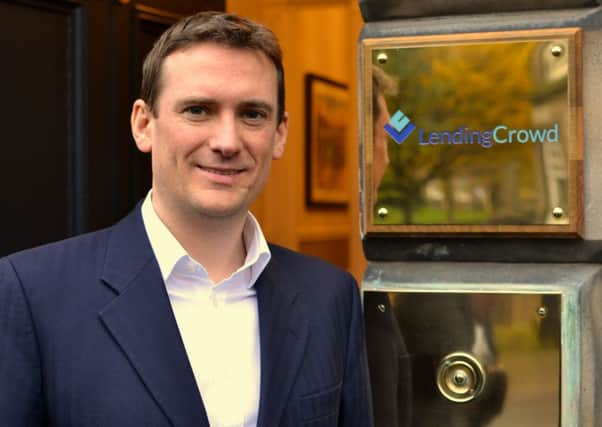How big is the crowdfunding market in Scotland?


The study also shows that Scotland accounts for just 4 per cent of the overall UK crowdfunding total, although that proportion has risen from a mere 1 per cent three years ago.
In terms of value, crowdlending makes up the bulk of the sector north of the Border, with firms receiving more than £20.5m in “peer-to-peer” loans to finance their expansion between October 2014 and September 2015. The average loan size was £50,000, with a typical interest rate of 10 per cent spread over 47 months.
Advertisement
Hide AdAdvertisement
Hide AdStuart Lunn, co-founder and chief executive of Edinburgh-based LendingCrowd, said: “The Scottish crowdfunding ecosystem is beginning to develop critical mass although we believe there is an opportunity to build a much bigger base in Scotland for alternative financing models.
“Leading industry commentators now agree that while peer-to-peer lending is not going to replace the traditional banking system, greater collaboration between the banks and new entrants like ourselves are in the interests of the SMEs that power economies worldwide. In Scotland, it’s important that we grasp the opportunity to embrace the inevitable rise of fintech so that we are at the forefront of developments rather than being in the following pack.”
LendingCrowd, co-founded by technology entrepreneur Bill Dobbie, launched in 2014 and since then has facilitated more than £5.35m of loans, including £1.5m for food home delivery specialist Diet Chef.
Today’s study, commissioned by Glasgow Chamber of Commerce in partnership with LendingCrowd, law firm Harper Macleod and banking group Santander, shows reward-based campaigns – offering “perks” in return for contributions – were the most popular form of fundraising in volume terms, with 842 successful pitches pulling in almost £2.6m.
However, less than a third of reward campaigns in Scotland prove successful, with some receiving nothing if they fall short of their fundraising target.
The final model, equity-based crowdfunding, brought in almost £4m from 11 campaigns, with Edinburgh-based accounting software start-up FreeAgent, co-founded by former RAF pilot Ed Molyneux, raising £1.2m.
Stuart Patrick, chief executive of Glasgow Chamber of Commerce, said: “The popularity and awareness of crowdfunding within Scotland has considerably increased since 2013. The country has expanded every aspect of its activity, shown by values collected, the diversity of projects, number of platforms and overall visibility.
“To sustain this momentum it is important to keep promoting awareness of crowdfunding’s potential as a viable source of finance to the business community.”
Advertisement
Hide AdAdvertisement
Hide AdHarper Macleod partner Paula Skinner, a key adviser on equity crowdfunding, added: “Those who have championed crowdfunding in Scotland, myself included, have been acutely aware that we have been playing catch-up on the rest of the UK.
“The report shows that we are rapidly getting there, with remarkable success rates for campaigns, and there is still capacity for growth. I expect this trend to continue, helped considerably by the establishment of crowdlending as a mainstream part of the funding mix for SMEs.”
Last month Royal Bank of Scotland expanded its range of “alternative” lenders – to whom it will refer SMEs unable to borrow directly from the state-backed group – from two to five. The panel, dubbed Capital Connections, includes two peer-to-peer or marketplace lenders. RBS launched its pilot scheme with Assetz Capital and Funding Circle last year, and has now added Iwoca, RBS Social & Community Capital and Together to the panel.
Steve Hand, regional business development director for corporate and commercial banking at Santander, which is hosting the launch of today’s report at its Glasgow headquarters, said: “The emergence of crowdfunding in recent years provides another source of funding for ambitious entrepreneurs to consider, whilst building early advocacy for new business products or services.”
The study was produced by Glasgow-based consultancy firm Twintangibles.
